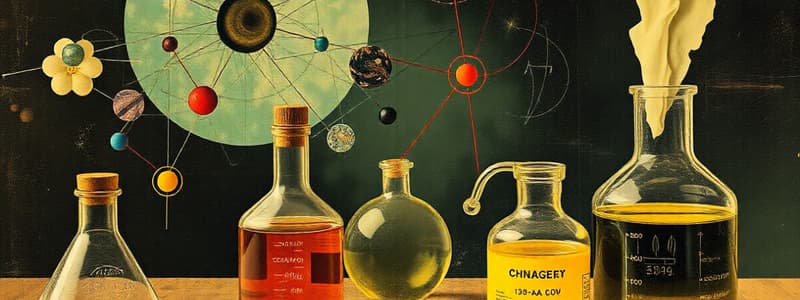Podcast
Questions and Answers
Which type of reaction involves the formation of a new compound from simpler reactants?
Which type of reaction involves the formation of a new compound from simpler reactants?
- Combustion reaction
- Displacement reaction
- Synthesis reaction (correct)
- Decomposition reaction
What is the primary reason for balancing chemical equations?
What is the primary reason for balancing chemical equations?
- To ensure the conservation of mass (correct)
- To simplify complex reactions
- To change the rate of reaction
- To increase the accuracy of measurements
In optics, what is the angle of incidence relative to the angle of reflection?
In optics, what is the angle of incidence relative to the angle of reflection?
- Always greater than the angle of reflection
- Inversely proportional to the angle of reflection
- Equal to the angle of reflection (correct)
- Always less than the angle of reflection
Which of the following best describes hyperopia?
Which of the following best describes hyperopia?
What characterizes a neutralization reaction between an acid and a base?
What characterizes a neutralization reaction between an acid and a base?
Flashcards
Refraction
Refraction
The bending of light as it passes from one medium to another, such as from air to water. This occurs because the speed of light changes in different mediums.
Neutralization Reaction
Neutralization Reaction
A chemical reaction where an acid and a base react to form salt and water. It is characterized by the release of heat and a pH change.
Synthesis Reaction
Synthesis Reaction
A type of chemical reaction where two or more substances combine to form a single, more complex product.
Decomposition Reaction
Decomposition Reaction
Signup and view all the flashcards
Mitosis
Mitosis
Signup and view all the flashcards
Study Notes
Ionic Compounds
- Ions gain or lose electrons to form a charge.
- Learn how to name ionic compounds.
Acids and Chemical Formulas
- Understand the definitions and chemical formulas of acids.
- Know the properties and characteristics of salts.
Types of Chemical Reactions
- Understand synthesis, decomposition, and other reaction types.
- Be able to identify different chemical reactions.
Optics
- Know the definitions related to optics.
- Understand the concepts of the angle of reflection and the angle of incidence.
- Understand how to use ray diagrams.
- Distinguish between convex and concave lenses.
- Understand optics calculations.
- Know the relationship between the index of refraction and the speed of light.
Vision Disorders
- Understand hyperopia (farsightedness) and myopia (nearsightedness).
- Predict how light bends.
Biology - Cell Structure and Function
- Understand the functions of organelles within cells.
- Know why cells divide.
- Identify and describe the different body systems.
- Understand the tasks of each body system.
- Understand the stages of mitosis, the cell division process.
- Distinguish between different muscle types and specialized cells.
- Learn the functions of organs within each system.
Chemical Equations
- Write word equations for skeletal equations and balance them.
- Explain the reasons for balancing chemical equations.
- Identify the evidence of a chemical change.
- Understand the pH scale.
- Know all optics equations.
Cell Biology
- Distinguish between animal and plant cells.
- Explain the stages of mitosis.
Body Systems and Function
- Describe how oxygen reaches the blood.
- Understand the skeletal system (and other systems).
- Be able to balance chemical equations, classify the type of equation, and explain why chemical equations need to be balanced.
Chemistry
- Understand neutralization reactions.
- Be able to construct diagrams.
- Construct Bohr-Rutherford diagrams.
- Understand how to translate between chemical names and formulas.
Diagrams
- Label two organelles on a cell diagram.
- Construct ray diagrams.
Studying That Suits You
Use AI to generate personalized quizzes and flashcards to suit your learning preferences.





